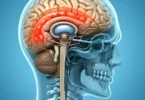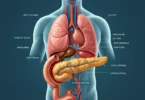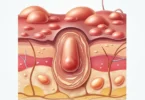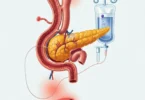Treatment Of Oral Cancer
The treatment of mouth cancer can be carried out by three standard methods of treatment (Radiotherapy, chemotherapy and surgery). Type of treatment depends on many factors like patient’s general condition, tumor size and degree of germination in the adjacent tissues and organs, the stage of tumor development. Furthermore, the treatment can often be combined with several types of therapies: For example, radiation therapy with surgery. In addition, the irradiation of the tumor is done before or after surgery. The same applies to the chemotherapy. This combination is used to improve the effectiveness of the treatment and help to remove the remaining parts of tumor which are not indicated by surgeon or cannot be removed without damaging adjacent tissues.
Surgical Treatment
Which type of surgery should be done depends on the volume of the tumor, size, location, degree of sprouting in adjacent organs, and the presence of metastases. The surgeon can remove the tumor that does not grow near organs or tissues, with minimal impact on the patient. In the case where the tumor is closely related to adjacent organs, penetrates deeply into it, the operation is much more difficult. In some cases, the surgeon has to remove a portion of the lower jaw or palate. In the case of cancer of the tongue or throat, surgeon remove tissues responsible for the act of swallowing. In addition, sometimes you may need to remove the larynx. If large amounts of tissue are removed, they can be prepared again with the help of prostheses.
Radiotherapy
The functional principle of radiotherapy is to effects malignant tumors cell with the help of ionizing radiations. Unfortunately, this radiation affects both cancer cells and healthy cells. However, particularly metabolism leads effect the cancer cells, because of the fact that cancer cells are more sensitive to radiation than healthy cells. The use of radiation can be performed as a remote control and a contact method. The first irradiation performed is carried out in a special chamber. In the second method uses a plurality of objects which emit radiation. They are applied to the tumor for some time.The radiation therapy can be used before and after surgery. Moreover, the radiation therapy is commonly performed with recurrence after surgery.
Chemotherapy
The chemotherapy is used to treat cancer because of the fact that they inhibit the vital activity of tumor cells and destroy them in based. Chemotherapeutics differ in their groups, in their appearance, as well as dose and mode of administration and the duration depends on the type of tumor, its size, stage and presence of metastases. Chemotherapy can be performed before radiotherapy or surgery to reduce the size of the tumor or after surgery or radiation therapy to destroy any remaining cancer cells. Because chemotherapy drugs directly added into the bloodstream, they affect all organs and tissues of the patient.
Side Effects Of Chemotherapy
Side effects of chemotherapy depend on the type of drug and its dose and duration of treatment. Mostly chemotherapy have side effects on the hematopoietic system as well as hair and gastrointestinal tract. The inhibition of growth of cells of the hematopoietic system. Most often this manifests in the suppression of white blood cells. These are the cells that fight infection. Therefore, during chemotherapy the patient suffer with a variety of infectious complications. Chemotherapeutics affect all cells of the body, but epithelial cells are most sensitive of tham, which are characterized by intensive update. Such cells are cells of the hair follicles and gastrointestinal tract. After chemotherapy, hair loss is usually observed. Hair grow again after cessation of therapy, but their color and texture is changed. Side effects in the gastrointestinal tract, manifest violation of appetite, nausea, vomiting, diarrhea, or the formation of ulcers in the mouth and lips.
Side Effects Of Cancer Treatment
All type of cancer treatment are aggressive in general, because they damaged healthy tissue along with the tumor. Therefore, it is very often accompanied by side effects. The effects are manifested in varying degrees from a given patient, and even in the same patient at different times of treatment. Side effects of radiotherapy are
- Dry mouth
- Sore throat
- To prevent this side effect, it is recommended to observe a good oral hygiene
- Fatigability
- Change the taste or smell
- Voice changes by irradiation of the larynx
- Changes in the skin at the site of irradiation (Radiation dermatitis)
For more general information:







